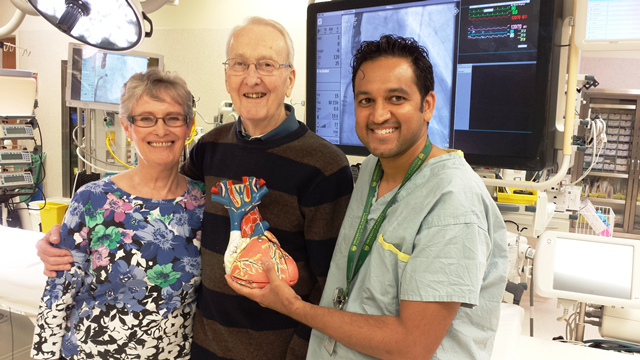
Having his golden years turn into gasping years was getting hard for retired RCMP officer Bruce Davis, once an exceptionally fit man who also protected Alberta premiers during his years of service.
“I used to have a treadmill at home and work out all the time,” says the 80-year-old Edmontonian. “But in recent years, my quality of life wasn’t good. I tired easily. I puffed on the stairs. I wasn’t interested in anything. Life had become a drag. All I could do was sit in a chair and read the paper.”
Davis was one of many #seniors living with shortness of breath, fatigue and heart failure due to a leaky mitral valve — but who are too frail or high risk for open-heart surgery.
In a heartbeat, his life changed for the better this past March when he underwent a new leading-edge repair procedure that has seen him regain his health and vitality. “It was painless. I didn’t feel a thing,” he says. “I had good success with that. I’m doing much better.”
His wife Kathy, a retired RN, recalls: “Before his surgery, gradually he became weaker and weaker, and less likely to get out of his chair. But right after his surgery, when he woke up, I could see colour in his cheeks for the first time in years.”
Dr. Kevin Bainey, an interventional cardiologist at the Mazankowski Alberta Heart Institute (Maz), says: “These people can’t even walk a block without being short of breath. With our new valve-clip procedure, we can improve upon that. Before this procedure, there were no other options for patients who could not have open-heart surgery.”
Their condition, known as mitral regurgitation (MR), is one of the more common types of heart valve disease, affecting nearly one in 10 people aged 75 years and older. It occurs when the flaps of the heart’s mitral valve — situated between the main pumping chamber, the left ventricle, and the left atrium, which receives all the blood from the lungs — fail to close completely, causing blood to flow backward into the left atrium and into the lungs.
To compensate and keep up blood flow through the body, the left ventricle pumps harder, straining the heart. Symptoms of MR include: shortness of breath, fatigue, coughing, lightheadedness and swollen feet or ankles. MR also raises the risk of irregular heartbeats, stroke and congestive heart failure, which can be life-threatening.
“Instead of having to open the chest, we can now repair the valve in a minimally-invasive way, using catheters inserted in the groin to guide the valve clip in place on the failing valve,” says Dr. Bainey. “This device grasps the valve flaps to close the centre of the valve, leading to relief of symptoms. Patients usually go home the next day, feeling much better.”
“Historically, these patients have been treated with surgery,” adds Dr. Ben Tyrrell, an interventional cardiologist with the CK Hui Heart Centre at the Royal Alexandra Hospital. “But often their heart muscle is just so weak that they’re not able to tolerate open-heart surgery, which also means they’re not candidates for a heart transplant or a mechanical heart, either.”
Teamwork between the Maz and the CK Hui has helped to bring the new procedure to Edmonton. To date, the pilot program has seen six patients undergo the procedure, which isn’t for everyone.
“It’s still a niche procedure right now,” says Dr. Tyrrell. “There are lots of anatomical considerations in picking the right patients for this catheter approach. There are tried-and-true surgeries that are still great therapy for a lot of patients.”
While surgical MR patients can expect to spend five to seven days in hospital, followed by three to six months of healing at home, valve-clip patients fully recover and go home within a day.
Meanwhile, on the research front, Edmonton will soon help to pioneer the replacement, via catheter, of the entire mitral valve with a newly-developed synthetic valve. The procedure is likely to be performed in the near future once a suitable patient has been identified.
“We’re part of an early feasibility study that was recently approved by Health Canada,” says Maz cardiac surgeon Dr. Steve Meyer. “We’re one of only three sites in North America doing this.”
Maz cardiologist Dr. Robert Welsh, Edmonton Zone Clinical Department Head for Cardiac Sciences, says: “#Minimally invasive approaches to valve therapy are revolutionary therapy. These technological advances are allowing us to improve quality of life for this important and growing patient population.”
Kathy Davis, married to Bruce for 55 years, says she’s thrilled with her husband’s new energy. “He now likes to get up and do things around the house. Last week we went for a kilometre walk. The other day he went outside and decided to sweep the deck. It’s been an enormous change.”
For his part, Davis adds: “While a valve repair may seem like a little thing, Dr. Bainey and his team have literally given me years more to enjoy with my grandchildren, my wife and my family. My ticker’s strong and I’m breathing easy now.”


